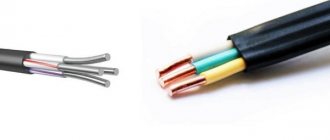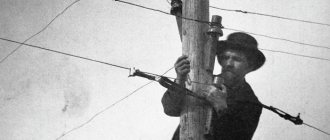The most important provision of the job description of an electrical engineer is a clearly defined requirement regarding the qualifications of the future employee, and specifically the point that concerns the employee’s safety group. A good specialist in his field knows how to think flexibly and broadly, using a solid foundation of knowledge that was acquired at the institute. The main task in the job responsibilities of an electrical engineer is to ensure reliable and trouble-free operation of serviced electrical equipment and devices, as well as strict compliance with labor safety rules when operating electrical installations.
Pros and cons of professions
The advantages of this profession are its demand in the labor market, the possibility of earning a decent income, as well as the possibility of part-time work, since an electrical engineer can get a part-time job and thus combine several job options. The disadvantages of the profession include high responsibility, irregular work schedule, and possible overtime.
Today, electrical engineers are in demand not only in construction companies, but also in production and in enterprises. An electrician's career develops in stages as he receives ranks.
- An electrician of the first category may not have a higher technical education at all. He performs basic work and knows how to use installation work equipment. However, he does not have access to high-voltage equipment.
- An electrician of the second category must work with electricity for 1-2 months and have a higher technical education. Only in this case is he allowed to work with objects with a low level of danger.
- An electrician of the third category must have work experience from 2 to 10 months, know the rules of working with high-voltage equipment, safety precautions and much more.
- Electrician IV category - a high-level specialist with work experience from 2 to 12 months minimum. Must have a very good knowledge of the structure of all systems and be able to apply their knowledge in practice in the case of repair and maintenance work.
- An electrician of the V category must not only know well, but also understand every safety provision, be able to train personnel and provide first aid if necessary.
Responsibility and qualification level
The degree of responsibility of a specialist, as well as the level of his salary, is determined by his qualification level. There are six qualifications in the profession. The first level means nothing, since its holders are only allowed to turn electrical equipment on and off. The second category also does not give the right to carry out work independently. An employee has the right to work only as an auxiliary worker in areas where special safety measures are not required.
Holders of the third category are allowed to service electrical installations, however, only in the presence of specialists with the highest category. The assigned fourth category allows you to perform independent work. Only holders of the fifth category can occupy leadership positions for distributing tasks and monitoring their implementation. Such employees can also independently maintain all equipment.
The sixth category must be obtained only when it is necessary to perform work of increased complexity, as well as when servicing networks in which the voltage is higher than 15 kW.
Where to study
To obtain higher education in this specialty, you must pass the Unified State Examination subjects such as mathematics, Russian, and physics. Engineers are trained primarily in full-time and part-time (evening) formats. In Moscow, the profession of electrical engineer can be obtained in:
- Moscow State Technical University named after. N.E. Bauman
- Moscow State Engineering University (MAMI)
- National Research Technological University "MISiS"
- Russian State University of Oil and Gas named after. THEM. Gubkina
- Peoples' Friendship University of Russia (RUDN)
- Moscow Aviation Institute (national research university) (MAI)
- National Research University "MPEI"
- National Research Nuclear University "MEPhI"
You can continue to study to become an engineer by taking advanced training courses for electrical engineers.
Assigning categories
The assignment of a category to an engineer is carried out based on the results of certification. Typically, the timing will be set by government agencies, but sometimes large companies or businesses will hire independent panels when they believe one or more workers could improve their skills. Otherwise, the following engineers can count on increased professionalism:
- Category 3 is applied for by a specialist with a higher education and at least 3 years of experience.
- Category 2 is applied for by a specialist who has a higher education and has at least 3 years of experience as a category 3 employee.
- Category 1 is applied for by a specialist who has a higher education and has at least 3 years of experience as a category 2 employee.
Thus, the assignment of a category to an engineer is carried out every three years. Sometimes this time is reduced to 2 years if the specialist worked in difficult conditions or temporarily performed the duties of an employee with higher qualifications. Of course, provided that he coped with his activities perfectly.
Best Universities to Study
The engineering profession can only be obtained at a higher educational institution. Various technical universities are suitable, of which there are many in Russia. In addition, there are corresponding specialties in many classical universities of a wide profile. Examples of the most famous higher schools:
- Moscow State Technical University named after. M. E. Bauman. One of the country's leading technical universities and a large research center with branches in Kaluga, Mytishchi and Dmitrov. It trains power engineers and electrical engineers to work in the field of mechanical engineering, robotics, and information systems. It is very difficult to enroll here, since the university is considered prestigious, but the high level of preparation justifies the effort.
- Research University "MPEI". Specializes in radio engineering, electronics, energy, IT technologies. The university includes 12 institutes (including electrical engineering) and 65 departments. It has its own thermal power plant, repair and technical center and pilot plant. Among the available areas of training are automation, technological systems and installations, vehicle equipment, industrial safety, relay protection.
- National Research Nuclear University "MEPhI". One of the largest scientific and technical centers in the country. On its territory there is a nuclear reactor used for new scientific developments. The British company QS included the university in the top 50 BRICS higher education institutions. Here, a future electrical and power engineer can master specialties related to the installation, commissioning and maintenance of nuclear power plant equipment, as well as automation of processes in the nuclear industry.
- State University of Maritime and River Fleet named after. Admiral S. O. Makarov. One of the leading industry universities for training personnel for water transport with branches in different regions of the country. The Faculty of Marine Energy trains highly qualified specialists in the operation of ship electrical equipment and automation equipment. As part of international programs, students undergo internships abroad - in Finland and the Netherlands.
- Peter the Great St. Petersburg Polytechnic University. It trains specialists to work at various types of power plants. There are areas related to the development and maintenance of technological installations, machines, devices and systems. Partner companies willingly hire university graduates, knowing that they are well prepared.
Almost all Russian regions have universities that train electrical engineers to work in industry, construction, housing and communal services and other areas.
Rights
An electrical engineer for the maintenance of utility networks has the right to:
3.1. For all social guarantees provided for by the legislation of the Russian Federation.
3.2. Receive information about the activities of the organization necessary to perform functional duties from all departments directly or through the immediate superior.
3.3. Submit proposals to management to improve your work and the work of the organization.
3.4. Get acquainted with draft orders of management relating to its activities.
3.5. Sign and endorse documents within your competence.
3.6. Take part in meetings where issues related to his work are discussed.
3.7. Require management to create normal conditions for the performance of official duties.
3.8. Improve your professional qualifications.
3.9. Other rights provided for by the labor legislation of the Russian Federation.
How much do they get
A few words about salary. It varies greatly depending on the qualifications of the specialist, his place of work and the region. A beginner employee can most often count on 15–20 thousand rubles, a more experienced one – 35–40 thousand. Designers receive 10-15% more.
In Moscow, salaries are higher than the Russian average and range from 40,000 to 60,000 rubles. If a master is not afraid of difficulties and is ready to work in the unfavorable climatic conditions of the Far North, then he can go to Chukotka or Sakhalin and receive more than 70,000 monthly there. Considering the applied nature of the profession, an electrical engineer always has the opportunity to earn more, especially abroad, where our specialists are highly valued.
Engineers 2nd category
An engineer of category 2, when performing his activities, must be guided by the regulatory documents of the organization in which he works. Also within his competence is the development of estimates and other documentation.
As a rule, the main job of category 2 engineers is to receive tasks from higher management, then divide them among subordinates. But in addition to this, he needs to coordinate documentation and activities with other departments. Naturally, an engineer cannot deviate from instructions given by more qualified specialists.
Tasks of the profession
The main task of an electrician is to carry out the process of constantly supplying electricity to various premises, including streets.
There are the following types of electrician profession:
- Electrical engineer – is involved in the direct design of electrical supply systems for a building and monitors the correct implementation of this project. Also capable of repairing devices and preventing possible emergencies. A person holding the position of an electrical engineer must have technical skills, knowledge of mathematics and drawing.
- Electrical technician - is directly involved in the repair of electrical devices, as well as prevents and eliminates all possible problems. His powers include preventive inspections of devices, carrying out measurements and calculations. An electrical technician must know the principle of operation of a transformer, the general structure of power systems, and automation systems.
- Electrician – assembles and repairs electrical networks, simple components, and lighting devices. Can also perform the work of a conventional electrician, inspecting and repairing power supply devices.
Chief building maintenance engineer
The responsibilities of the chief engineer include:
- ensuring the functioning of all communications of the building, including the creation of conditions for the work of engineering and energy personnel;
- management of the development of promising and current repair measures for energy equipment and communication networks of all types (fiber optic lines, power supply, water supply network, sewerage, elevators, etc.);
- supervising the implementation of measures approved by the schedule to improve all types of energy supply to the building.
Chief building maintenance engineer
About the profession of Electrical Engineer, which can be obtained in Kazan
Bachelor's and Specialist's Degrees14 Master's Degrees5
Universities4
An electrical engineer designs electrical power systems. He develops projects to provide energy to individual buildings, businesses and even entire cities.
Another area of activity of an electrical engineer is the design of electrical machines and devices, individual parts of industrial installations. Not a single industrial enterprise that uses power equipment can do without an electrical engineer.
An electrical engineer may also be involved
An electrical engineer designs electrical power systems. He develops projects to provide energy to individual buildings, businesses and even entire cities.
Another area of activity of an electrical engineer is the design of electrical machines and devices, individual parts of industrial installations. Not a single industrial enterprise that uses power equipment can do without an electrical engineer.
An electrical engineer may also be involved in the operation, maintenance and repair of the electrical parts of various equipment and buildings.
Expand
Description of the profession
Engineer
is a specialist inventor who creates or improves technical mechanisms. The profession dates back several hundred and even thousands of years. The greatest famous engineers include Archimedes, Leonardo da Vinci, Nikola Tesla, Henry Ford, Sergei Korolev, Elon Musk, and the line of brilliant techies will never dry up.
Popular directions and specializations
Engineering specialists work in mechanical engineering, oil and gas production, construction, and all types of production. They are involved at every stage of product creation. Therefore, there are specialists who design, those who organize the production of parts. There are engineers who monitor safety, and those who maintain the created equipment.
- ✔ Design engineer
- a specialist who designs diagrams of parts and mechanisms, and also participates in the process of their production, assembly and testing.
✔ Design engineer
- designs entire construction projects or individual communication systems (for example, water supply, heating, telephony and Internet, electrification of facilities).
✔ Test engineer
is a technical specialist who tests new machines, equipment, equipment or individual components and makes recommendations for improving the product.
✔ Civil engineer
is a specialist who is involved in the design, construction and repair of buildings and structures, bridges and roads, as well as planning, organizing and coordinating construction work.
✔ Robotics engineer, mechatronics
- develops the architecture and puts into operation robots, devices and complex robotic systems.
✔ Process engineer
is a specialist who organizes the production process.
✔ Energy engineer
- deals with the design and operation of heat and energy supply systems.
✔ Telecommunications engineer
- designs stations and communication nodes, data transmission networks.
✔ Service engineer
is a specialist who installs, maintains and repairs mechanisms.
How close is the engineering profession to me?
TAKE THE FREE TEST “HUMANITIES OR TECHNICIAN” >> The profession “engineer” is becoming synonymous with “technical specialist”, so among engineering specialties there are also chemical engineers, drilling engineers, safety engineers, QA engineers (software testers). A more complete selection and description of engineering professions can be found in the Professions section >>
Did you know
that the richest man in the world, Amazon CEO Jeff Bezos, is an engineer by training? He graduated from Princeton University with a degree in Electrical and Computer Engineering. In 2000, Bezos even founded the private aerospace company Blue Origin, which boasts successful test launches of the New Shepard spacecraft.
About the profession of Electrical Engineer in Samara
Salaries: how much does an Electrical Engineer earn*
20,000 per month
Experienced:
30,000 per month
Professional:
40,000 per month
* - information on salaries is given approximately based on vacancies on profiling sites. Salaries in a specific region or company may differ from those shown. Your income is greatly influenced by how you can apply yourself in your chosen field of activity. Income is not always limited only to what vacancies are offered to you on the labor market.
Demand for the profession
Today, the demand for the electrician profession is high, since qualified specialists in this field are needed in many areas, for example, in construction, industry, and housing and communal services. Representatives of this specialty are engaged in the assembly and disassembly, maintenance and repair of electrical equipment, both domestic and industrial.
Who is the profession suitable for?
In the profession of an electrical engineer, such qualities as well-developed logical thinking, the ability to make quick decisions, caution, attention to detail, and good memory are important. An electrical engineer must be meticulous and very responsible as he is responsible for the safety of the environment and other people
Career
An electrician's career develops in stages as he receives ranks.
- An electrician of the first category may not have a higher technical education at all. He performs basic work and knows how to use installation work equipment. However, he does not have access to high-voltage equipment.
- An electrician of the second category must work with electricity for 1-2 months and have a higher technical education. Only in this case is he allowed to work with objects with a low level of danger.
- An electrician of the third category must have work experience from 2 to 10 months, know the rules of working with high-voltage equipment, safety precautions and much more.
- Electrician IV category - a high-level specialist with work experience from 2 to 12 months minimum. Must have a very good knowledge of the structure of all systems and be able to apply their knowledge in practice in the case of repair and maintenance work.
- An electrician of the V category must not only know well, but also understand every safety provision, be able to train personnel and provide first aid if necessary.
Responsibilities
- design, construction of the electrical part of industrial plants and equipment, power supply systems for cities, enterprises, etc., design of electrical machines and devices;
- development of technological processes for power supply;
- ensuring installation, adjustment, testing and maintenance of electrical equipment;
- planning the repair of electrical equipment, drawing up technical specifications for the reconstruction of existing equipment and the creation of new equipment;
- calculation of the economic efficiency of implemented technological and design solutions;
Rate the profession:
12345678910
Results
Not a single business entity, carrying out its activities, can do without electrical energy. It can be used to provide lighting, for the operation of electrical appliances, technological lines, video surveillance and alarm systems. Therefore, we can judge the demand for professions related to the maintenance of electrical networks. It takes time to make a career in this field, since promotion implies the need to assign a higher rank, which is impossible without certain skills and experience, the acquisition of which occurs over a certain period, regulated by regulations.
Without experience in conducting activities in a similar field, it is not allowed to work with electrical installations in any position, especially in a managerial position. Having a higher education is a guarantee of certain knowledge, as well as the fact that a person can draw conclusions and make independent decisions, as a result of which his work activity is more meaningful. Employers are more willing to hire a person with little work experience, but with a higher education, since it is believed that for such applicants the process of accumulating experience and knowledge will have a more positive dynamic.
Hundreds of interesting vacancies for an electrical engineer in Moscow on Trud.com
You can recruit qualified workers and install the most modern equipment at the enterprise, but in the absence of uninterrupted power supply, production will not be able to function. Electricity is one of the most optimal types of energy, capable of ensuring full operation of equipment and lighting. On the other hand, electric current can be dangerous to human life. Troubleshoot electrical problems, monitor compliance with safety precautions when using them, etc. – all these tasks are assigned to the electrician.
There are many ways to find a job, but in most cases, all roads lead the electrical engineer job seeker to the Internet. And this is not surprising, because this is where the greatest opportunities for quick and easy employment are. There are many job sites that are full of employers’ publications about the company’s need for an electrical engineer in Moscow. All you need to do is open the site you are interested in and select vacancies there. And so one after another in turn. This activity may take much longer than you would like.
Engineers category 3
A category 3 engineer is a performer who carries out orders and instructions from senior management. Usually the role of the latter is played by more qualified specialists. Despite the fact that the engineer performs the bulk of his work under close supervision, he can do some actions independently:
- Choose auxiliary materials that will be more convenient for him to use.
- Independently improves his skills and studies the necessary materials.
- Develops documentation and signs it before handing it over to the manager.
Thus, despite limited obligations, all category 3 engineers represent an independent working unit that needs to coordinate its actions with specialists.
Who is it suitable for?
The specialty of an electrical engineer will be of interest primarily to men with a technical mindset, although women often perform just as well in the profession. What you will need to know in order to work effectively:
- laws, regulations and other documents related to the maintenance of electrical networks and equipment;
- rules for operation and scheduled repair of equipment, modes of operation, technical characteristics and design features;
- the procedure for drawing up estimates for repairs, as well as the purchase of electrical equipment and components;
- labor protection and fire safety rules;
- computer drawing programs (if the specialist is engaged in design).
As for personal qualities, the most important for an electrical engineer are developed logical thinking, responsibility, good memory, patience and caution, attention to detail, the ability to approach work systematically, the ability to quickly respond to emergency situations and make the right decisions, leadership qualities, readiness constantly improve your skills. The advantages of the profession include its high demand and good career prospects. Disadvantages - danger to health and life (risk of electrical injury), often irregular schedule, need to constantly monitor the development of technology
Disadvantages - danger to health and life (risk of electrical injury), often irregular schedules, the need to constantly monitor the development of technology
The advantages of the profession include its high demand and good career prospects. Disadvantages - danger to health and life (risk of electrical injury), often irregular schedule, the need to constantly monitor the development of technology.
What is an electrical engineer's responsibility?
A power engineer must have a technical mindset, well-developed fine motor skills, attentiveness, excellent vision, and responsibility.
An electrical engineer's job description typically requires responsibility for:
- Failure to perform, negligent performance of direct work duties.
- Partial or complete non-compliance with current orders, instructions and orders of the organization’s management.
- Violation or failure to comply with the internal regulations of the organization, failure to comply with labor discipline.
- Failure to comply with safety regulations.
- Causing material damage to the enterprise.
- Offenses that arose during the course of work.
If desired, the employer can expand the list of employee responsibilities within the limits determined by the legislation of the Russian Federation.
About the profession of Electrical Engineer in Moscow
Salaries: how much does an Electrical Engineer earn*
Beginner:
20,000 per month
Experienced:
30,000 per month
Professional:
40,000 per month
* - information on salaries is given approximately based on vacancies on profiling sites. Salaries in a specific region or company may differ from those shown. Your income is greatly influenced by how you can apply yourself in your chosen field of activity. Income is not always limited only to what vacancies are offered to you on the labor market.
Demand for the profession
Today, the demand for the electrician profession is high, since qualified specialists in this field are needed in many areas, for example, in construction, industry, and housing and communal services. Representatives of this specialty are engaged in the assembly and disassembly, maintenance and repair of electrical equipment, both domestic and industrial.
Who is the profession suitable for?
In the profession of an electrical engineer, such qualities as well-developed logical thinking, the ability to make quick decisions, caution, attention to detail, and good memory are important. An electrical engineer must be meticulous and very responsible as he is responsible for the safety of the environment and other people
Career
An electrician's career develops in stages as he receives ranks.
- An electrician of the first category may not have a higher technical education at all. He performs basic work and knows how to use installation work equipment. However, he does not have access to high-voltage equipment.
- An electrician of the second category must work with electricity for 1-2 months and have a higher technical education. Only in this case is he allowed to work with objects with a low level of danger.
- An electrician of the third category must have work experience from 2 to 10 months, know the rules of working with high-voltage equipment, safety precautions and much more.
- Electrician IV category - a high-level specialist with work experience from 2 to 12 months minimum. Must have a very good knowledge of the structure of all systems and be able to apply their knowledge in practice in the case of repair and maintenance work.
- An electrician of the V category must not only know well, but also understand every safety provision, be able to train personnel and provide first aid if necessary.
Responsibilities
- design, construction of the electrical part of industrial plants and equipment, power supply systems for cities, enterprises, etc., design of electrical machines and devices;
- development of technological processes for power supply;
- ensuring installation, adjustment, testing and maintenance of electrical equipment;
- planning the repair of electrical equipment, drawing up technical specifications for the reconstruction of existing equipment and the creation of new equipment;
- calculation of the economic efficiency of implemented technological and design solutions;
Rate the profession:
12345678910
Features of the profession
In addition to the above job responsibilities, electronics engineer:
- draws up technical specifications and documentation, as well as instructions and guidelines for working with electronic equipment;
- provides technical consultations and trains users or customers in working with electronic equipment.
The responsibilities of an electronics engineer depend on the place of work and his specialization. On job sites, the position of an electronics engineer can be called differently: electronic equipment (electronic equipment) development engineer, printed circuit board development engineer, electronics design engineer.
Functional responsibilities of a development engineer:
- development of circuit diagrams and printed circuit boards;
- preparation of technical documentation;
- installation and testing of prototypes;
- start-up and adjustment of electronic equipment;
- production support and service;
- carrying out preventive and current repairs;
- ordering spare parts and components for equipment.
Network repair and maintenance engineer
A future engineer for the maintenance and repair of electrical distribution networks (IRES) is hired with an education as an electrician, for which he must present a diploma from the university where students are taught to become an electrician.
When accepting a position as an ordinary IRES, no experience in the specialty is required. As professional growth progresses over 3 years, the specialist is assigned the next level of qualification.
IRES is assigned the 2nd and 1st categories. This allows the engineer to become a more skilled worker. To obtain the 1st degree of qualification, an employee of the second category must work for exactly 3 years.
Electrical node testing
IRES in its work is guided by:
- orders, acts and instructions of the enterprise administration;
- safety rules, labor protection, sanitary standards and fire safety rules;
- job description;
- orders of the direct superior.
Energy engineer - job responsibilities
Responsibilities of an electrical engineer:
- Must ensure competent work, as well as modernization and timely repairs of energy equipment, electrical networks, gas and air pipelines.
- Determine the amount of fuel and energy resources required for production activities. Develop justifications for technical modernization, reconstruction and development of the energy sector.
- Prepare applications for the purchase of necessary equipment, spare parts, and materials. Perform calculations that are intended to carry out a set of measures to save resources. Study the organization's needs for thermal and electrical resources.
- Draw up schedules to reduce energy loads that occur on energy systems during peak hours and monitor the implementation of these schedules.
- Take part in acceptance and testing of power plants and networks, installation of electrical equipment. Consider the causes of power equipment accidents and develop measures to avoid such situations, create safe working conditions.
- Organizes testing and inspection of relay protection equipment.
- Carries out technical supervision, as well as control over electrical, instrumentation and thermal equipment used in the organization.
- Monitor and supervise compliance with operating instructions for electrical equipment.
- Prepares and draws up the necessary documentation for concluding contracts with various organizations.
- Ensures compliance with all labor safety standards and regulations during the operation of electrical installations and networks.
- Prepares all types of reporting according to approved indicators and forms.
- Carry out official assignments from your immediate superior.
About the profession of Electrical Engineer in Nizhny Novgorod
Salaries: how much does an Electrical Engineer earn*
Beginner:
20,000 per month
Experienced:
30,000 per month
Professional:
40,000 per month
* - information on salaries is given approximately based on vacancies on profiling sites. Salaries in a specific region or company may differ from those shown. Your income is greatly influenced by how you can apply yourself in your chosen field of activity. Income is not always limited only to what vacancies are offered to you on the labor market.
Demand for the profession
Today, the demand for the electrician profession is high, since qualified specialists in this field are needed in many areas, for example, in construction, industry, and housing and communal services. Representatives of this specialty are engaged in the assembly and disassembly, maintenance and repair of electrical equipment, both domestic and industrial.
Who is the profession suitable for?
In the profession of an electrical engineer, such qualities as well-developed logical thinking, the ability to make quick decisions, caution, attention to detail, and good memory are important. An electrical engineer must be meticulous and very responsible as he is responsible for the safety of the environment and other people
Career
An electrician's career develops in stages as he receives ranks.
- An electrician of the first category may not have a higher technical education at all. He performs basic work and knows how to use installation work equipment. However, he does not have access to high-voltage equipment.
- An electrician of the second category must work with electricity for 1-2 months and have a higher technical education. Only in this case is he allowed to work with objects with a low level of danger.
- An electrician of the third category must have work experience from 2 to 10 months, know the rules of working with high-voltage equipment, safety precautions and much more.
- Electrician IV category - a high-level specialist with work experience from 2 to 12 months minimum. Must have a very good knowledge of the structure of all systems and be able to apply their knowledge in practice in the case of repair and maintenance work.
- An electrician of the V category must not only know well, but also understand every safety provision, be able to train personnel and provide first aid if necessary.
Responsibilities
- design, construction of the electrical part of industrial plants and equipment, power supply systems for cities, enterprises, etc., design of electrical machines and devices;
- development of technological processes for power supply;
- ensuring installation, adjustment, testing and maintenance of electrical equipment;
- planning the repair of electrical equipment, drawing up technical specifications for the reconstruction of existing equipment and the creation of new equipment;
- calculation of the economic efficiency of implemented technological and design solutions;
Rate the profession:
12345678910
What does an electrical engineer do?
The demand for specialists with technical education and good professional skills in the Ukrainian labor market remains invariably high. Electrical engineers are most often needed for manufacturing. Large enterprises and organizations also need specialists in this profile. Hotel and restaurant establishments cannot do without competent electricians. Salary offers for those wishing to work in a similar position start from UAH 5 thousand in the regions of Ukraine. Salaries for employees with managerial responsibilities start at UAH 10 thousand. And highly qualified specialists involved in project development can qualify for a salary of 15 thousand UAH.
Features of the profession
An electrical engineer is a professional who is involved in the design, operation and control of processes related to electrical power distribution. Among the main tasks of an electrical engineer is the organization and provision of operation and maintenance of electrical networks, which are on the balance sheet of the enterprise, electric motors, electrical equipment and internal wiring. The specialist is responsible for the rational use of electricity and compliance with safety rules by other employees.
The instructions of the electrical engineer related to the performance of his duties are mandatory for all subordinates. And orders for the maintenance of electrical networks and the use of electrical equipment must be followed by all personnel.
Since the position of an electrical engineer is a management position, electricians and electromechanics may be subordinate to him.
Responsibilities of an Electrical Engineer
For those interested in the profession of “electrical engineer,” the responsibilities of this specialist are often familiar only in general terms. An analysis of vacancies, employer requirements, and job descriptions gives an idea of the gradation of complexity of tasks assigned to specialized specialists.
Electrical engineers at the start of their careers will be involved in setting up, repairing and regulating electrical appliances and electrical circuits in various equipment. Their responsibilities will include connecting and disconnecting switchboards at commercial sites, laying cables and wires at commercial sites, and other electrical installation work.
The head of the electrical installation work section is a position with higher responsibility. The successful applicant will have to work with energy transmission companies and monitor the implementation of labor safety briefings. He will be fully responsible for all appliances and electrical networks.
The next step in your career is design engineer. The specialist's responsibilities are as follows:
- development of projects for connecting generating units to the power grid;
- connecting users to the network;
- development of interior and exterior lighting projects;
- designer's supervision of projects.
Knowledge and skills
Depending on the complexity of the duties, employers' requirements for applicants differ. But in general terms the idea of what an electrical engineer should know is the same. And the main requirement is the necessary availability of higher technical education.
Electrical engineers without experience, entry-level specialists will be expected to have basic knowledge of electronics, relay automation, electrical networks in the domestic sphere, reading and drawing electrical circuit diagrams.
To qualify for a position in an industrial enterprise, an electrical engineer must demonstrate:
- ability to read and draw electrical diagrams of various types of complexity;
- experience working with electrical equipment;
- understanding of the physical processes underlying and influencing the operation of electrical equipment;
- an understanding of the principles of assembling complete devices;
- knowledge of the basics of building power supply at an industrial enterprise.
To develop projects, in addition to higher electrical engineering education, the candidate will need at least five years of work experience in design organizations; knowledge of construction regulations and software (AutoCAD, MsOffice).
All specialists in this profile need knowledge of general labor protection and fire safety rules; rules for the safe operation of electrical installations; safety standards in electrical facilities approved in Ukraine.
Similar professions that can be obtained at Moscow universities:
| Name | Universities by profession | Colleges by profession |
| Intelligent systems specialist in the humanitarian field | 38 | — |
| Energy Engineer | 17 | — |
| Energy system dispatcher (energy dispatcher) | 26 | — |
| Electrical Engineer | 16 | — |
| Electronics engineer | 31 | — |
| Electrical Engineer | 16 | — |
| Marketer of energy markets | 16 | — |
| Energy Generation Systems Modernization Manager | 16 | — |
| Meteoenergetic | 16 | — |
| Network installer/controller for distributed energy | 16 | — |
| Recovery system designer | 16 | — |
| Energy storage designer | 16 | — |
| Developer of microgeneration systems | 16 | — |
| Energy systems developer | 16 | — |
| Smart Grid Systems Engineer | 16 | — |
| Specialist in local energy supply systems | 16 | — |
Requirements for the profession of an electrician
Each employee has his own skill level. This profession provides for six categories and five groups of electrical safety clearance.
There are five classes:
- Have basic knowledge. This can be considered a full-time electrician with specialized education. Specialists have the skills to ensure safety and provide first aid.
- An electrician with an education in electronics has knowledge of high-voltage equipment.
- In this group, the employee must have sufficient information about the work, know the rules for operating electrical equipment, as well as the nuances of safety precautions.
- The fourth group includes highly qualified specialists who have the basic principles and know the design features of electrical equipment. A 4th class electrician carries out repair and maintenance work.
- Specialists with in-depth knowledge in the field of electronics, who know the basic circuits and nuances of the area under their jurisdiction.
Engineers' rights
All categories of engineers, regardless of their experience or professionalism, have certain rights. They are as follows:
- Offer management various ways to help improve working conditions and make them more organized.
- Use scientific literature and materials that will help you cope with your responsibilities. That is, any engineer does not have to memorize all the information; from time to time he can use books or magazines.
- Pass certification in accordance with the procedure established by the enterprise or state. In the process, they can receive a new category, as well as remain at the same level of qualification.
- Improve your qualifications with all the ensuing consequences. That is, after receiving a new category, the employee has the right to a higher salary, better working conditions, new entries in work books, and so on.
In addition to those listed above, engineers have the opportunity to enjoy all the rights that are specified in the Labor Code of the country where their work activities are carried out.
About the profession of Electrical Engineer in St. Petersburg
Salaries: how much does an Electrical Engineer earn*
Beginner:
20,000 per month
Experienced:
30,000 per month
Professional:
40,000 per month
* - information on salaries is given approximately based on vacancies on profiling sites. Salaries in a specific region or company may differ from those shown. Your income is greatly influenced by how you can apply yourself in your chosen field of activity. Income is not always limited only to what vacancies are offered to you on the labor market.
Demand for the profession
Today, the demand for the electrician profession is high, since qualified specialists in this field are needed in many areas, for example, in construction, industry, and housing and communal services. Representatives of this specialty are engaged in the assembly and disassembly, maintenance and repair of electrical equipment, both domestic and industrial.
Who is the profession suitable for?
In the profession of an electrical engineer, such qualities as well-developed logical thinking, the ability to make quick decisions, caution, attention to detail, and good memory are important. An electrical engineer must be meticulous and very responsible as he is responsible for the safety of the environment and other people
Career
An electrician's career develops in stages as he receives ranks.
- An electrician of the first category may not have a higher technical education at all. He performs basic work and knows how to use installation work equipment. However, he does not have access to high-voltage equipment.
- An electrician of the second category must work with electricity for 1-2 months and have a higher technical education. Only in this case is he allowed to work with objects with a low level of danger.
- An electrician of the third category must have work experience from 2 to 10 months, know the rules of working with high-voltage equipment, safety precautions and much more.
- Electrician IV category - a high-level specialist with work experience from 2 to 12 months minimum. Must have a very good knowledge of the structure of all systems and be able to apply their knowledge in practice in the case of repair and maintenance work.
- An electrician of the V category must not only know well, but also understand every safety provision, be able to train personnel and provide first aid if necessary.
Responsibilities
- design, construction of the electrical part of industrial plants and equipment, power supply systems for cities, enterprises, etc., design of electrical machines and devices;
- development of technological processes for power supply;
- ensuring installation, adjustment, testing and maintenance of electrical equipment;
- planning the repair of electrical equipment, drawing up technical specifications for the reconstruction of existing equipment and the creation of new equipment;
- calculation of the economic efficiency of implemented technological and design solutions;
Rate the profession:
12345678910
Description
An electrician is a specialist whose work is related to electrical devices and equipment. These masters have their own classification. We can distinguish simple electricians who deal with household electrical equipment and electricians. These specialists work with high capacities at thermal power plants, hydroelectric power stations, etc. Every day they face the full range of dangers that high voltage poses.
There are many processes involved in the work of an electrician. There are admission rules for their implementation. A novice specialist will never deal with a high level of danger (voltage more than 1000 V). There are 5 access classes for qualification:
- First. This is any employee of the organization who does not have a specific education, but at the same time he knows about the dangers, first aid and ways to avoid defeat. Such an employee is not allowed to work with electrical equipment, especially high-voltage equipment.
- Second. This is a specialist with education in the electrical field. He knows the basics of high-voltage equipment, all the dangers of working with it and first aid methods. This specialist must have special training and work with electricity for 1-2 months. Allowed for objects with a low level of danger.
- Third. This specialist knows a lot of information about electricity: rules for working with high-voltage equipment, dangers of injury, safety rules, rules for admission to work with equipment under voltage up to 1000 V. Special training and work experience from 2 to 10 months are required.
- Fourth. This is a high-level specialist. He must know not only the general provisions, but also the design features of the equipment, which components must be turned off for repair or maintenance work, and how to find them in reality. A level 4 electrician knows everything about the territory under his control, down to the smallest microcircuit. He knows how to distribute responsibilities between employees and teach them the specifics of his work. Also, an electrician not only knows the rules of first aid, but also knows how to put them into practice. Work experience must be from 2 to 12 months minimum.
- Fifth. More in-depth knowledge of all the schemes and nuances of your site. Knowledge not only of safety precautions, but also an understanding of the reasons for all its provisions. Ability to train personnel and provide first aid in case of electric shock. Work experience ranges from 3 to 42 months minimum.
The profession of an electrician requires a high level of concentration and responsibility not only for one’s own life, but also for the health of subordinates.
What specialties to study?
To get the opportunity to work as an electrician, you should choose the specialty “Relay protection and automation of electrical power systems.”
Important qualities
The profession of an electrician requires logical thinking, a technical mindset, good fine motor skills, keen vision, attentiveness, accuracy, and responsibility. Diseases of the musculoskeletal system, eyes, and nervous system are considered contraindications.











